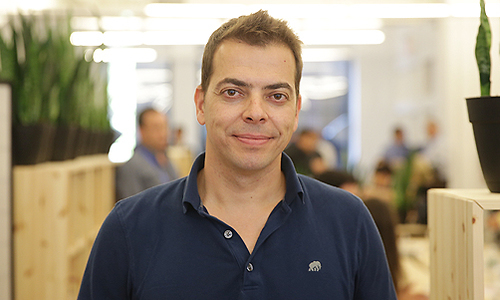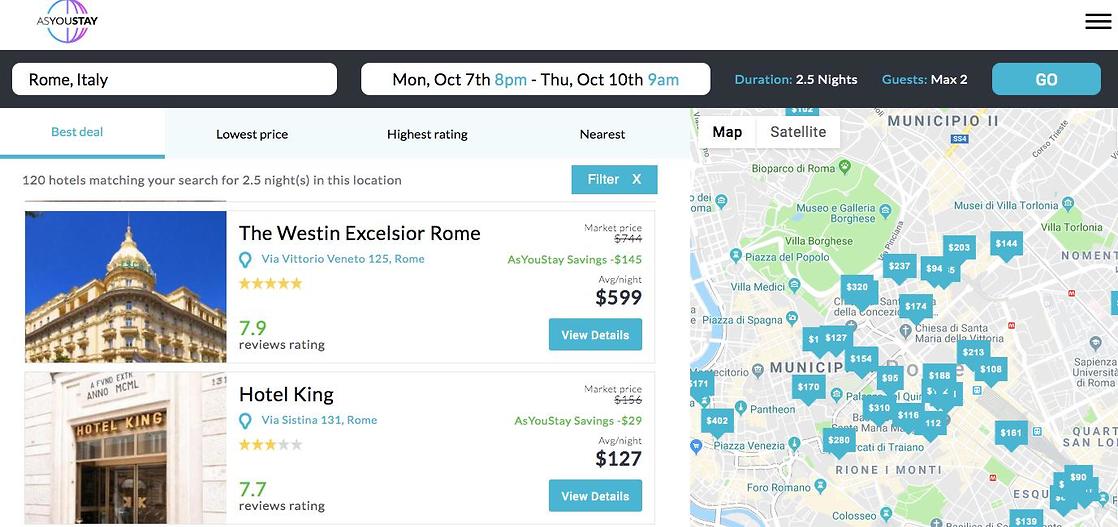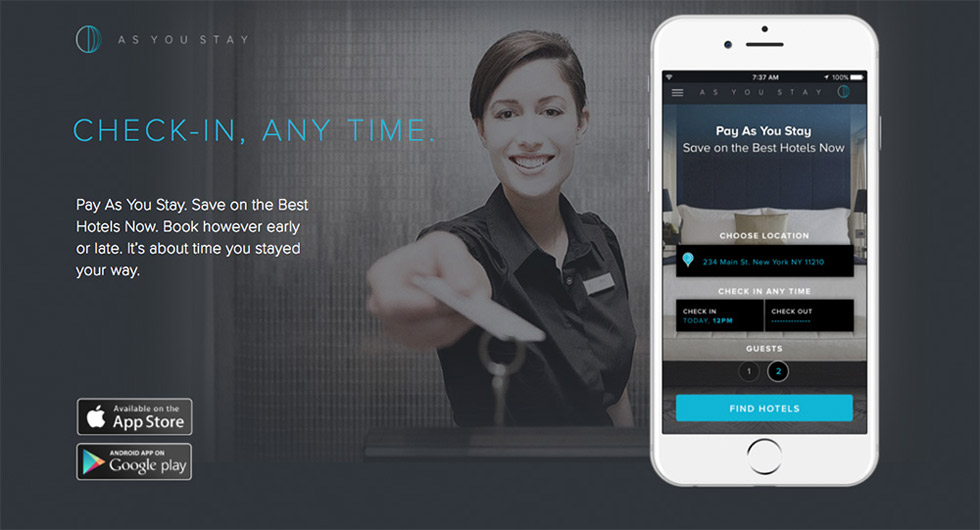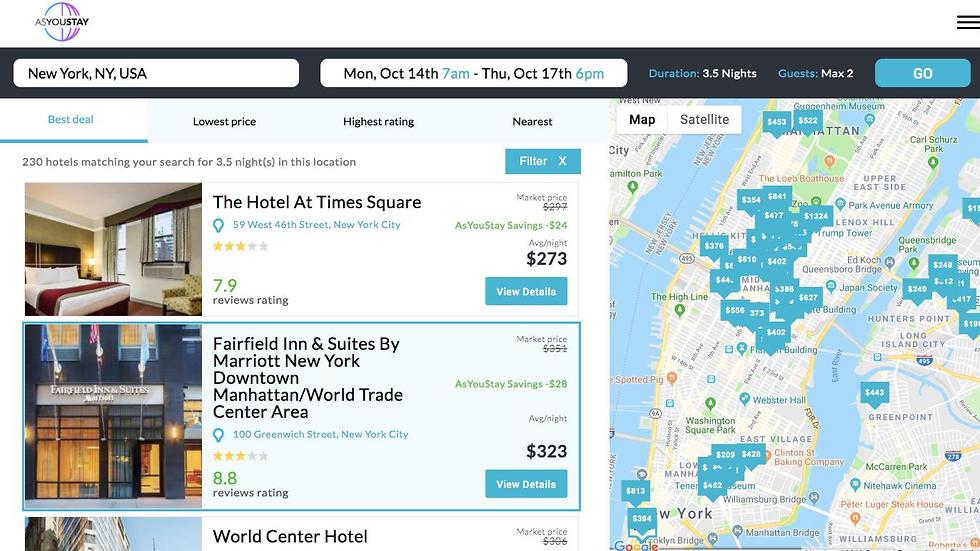
How many times have you arrived at a hotel at check-in time only to be told by the receptionist that your room is not ready yet?
Alternatively, how many times you wanted to stay at a hotel for a few more hours as your flight departs late at night, but you were forced to pay almost the same rates as for a full day?
A new Israeli app wants to change the world of hotel stays - which has remained largely in the past - making the 3pm check-in and noon check-out a thing of the past.
Three months after its soft launch, "As You Stay" founder and CEO Ofer Helfman says the app will forever change the way hotel reservations are made.
“Nothing interesting has taken place in this industry for over a decade and therefore this kind of development could be a breath of fresh air in the sector, but it is not alone," says Helfman.
"There are hundreds of new companies in the travel-tech field, which is among the most technologically advanced in the world. We are simply a product that is different from the rest. For an industry that claims to give service - the service is not that great."

How was it that no one has thought of this before?
EH: Because it always looked so complicated, but that is actually not the case. At the outset I told myself, ’if we reached the moon then for sure we can solve the issue of check-in and check-out hours at hotels.'”
It’s actually quite upsetting that it has not been solved before now. The whole tourism sector has rapidly developed in recent years and advanced from a technological perspective, in order to better and more accurately serve the customer. If in aviation and car rental they are far more advanced and everything is conducted according to a specific hour, then hotels, the most popular product in the sector, are behind the times.
The fact that we have been used to doing the same thing for years is not a reason why we cannot correct the way things are done. The hotels suffer the most and there is frustration from the customers. For an industry that claims to offer service, one has to say that the service is nothing to write home about.
So how would it work?
EH: Our solution comes from the technological approach, through the optimization in the purchase of rooms, which allows for flexibility for the customer. We have developed unique technology that takes the existing standard and breaks it up for the hotel.
For the customer it's easy, you go to the website or the app, choose the desired dates, and then onto the add-on for hours. This means that the time frame drops from days to hours.
How did you come up with the idea?
EH: Many hoteliers talk about a common frustration, whcih is that they do not know when a customer leaves or arrives at their hotel. This makes the whole process grossly inefficient, and the solution is data that we provide a week or month in advance and not at the time of check-in or check-out.
It's exactly like airlines and restaurants where customers make reservations for an exact hour, so this works in a similar fashion.
The app was devised with a clear vision that the way hotels work today is illogical, when customers either arrive too early or too late at the hotel and do not receive what they paid for.
We thought about how to serve travellers worldwide and help them reserve a hotel according to their exact needs, and take the process one step further, which means paying for the hours the customer is actually using the room, so the price is fair.
For example, if the price of the room is $200 a night then the additional amount for a half day would be around $60 to $80 dollars, and not a price that would make it unattractive.
Why would hoteliers cooperate with you?
EH: First of all, it saves them money and headaches. We take on the headache of the exact time of arrival and departure of a customer.
I’ll explain how the system works today: Every hotel determines room price on its own and then the two major companies, who are in effect a duopoly in the hotel sector, add their commission, which in most cases is very high. These companies are Expedia and Priceline, which own all the reservation sites such as Hotels.com, Booking.com and Agoda.
We are proposing lower commissions, and by so doing want to give the customer a corrective experience. For years customers paid exaggerated commissions without even knowing it and this created a situation in which they were serving the hotels and the companies and the reservation sites instead of the hotels serving their customers.
Now in our case, the hotel is not negatively impacted since it nets the same wholesale price, just without all the commissions on top of it that go to the middlemen..
In addition, we work directly with hotels and also with Priceline and other suppliers. We are in effect an online travel agency.
Initially we worked directly with the hotels, but then we saw that this complicated matters for them, so now we buy rooms from them at relatively cheap wholesale prices and do our own optimization so that it is profitable for us but still fair for the customer.
The bottom line is that the hotels agree with the premise that if the customer stays less time, he or she will get a discount.
But there is logic in the difference between the check-out time and the time at which one receives a room, as rooms have to be cleaned and straightened in between guests.
EH: On one hand, cleaning a room takes 20 minutes on average and on the other hand a large number of rooms cannot be cleaned between noon and 3 PM.
(Helfman, who over the past decade worked in the hotel sector and in apartment rentals in the U.S., says he knows what is needed in order to prepare a room for a new customer - SH)
All of this is due to a total lack of efficiency. Why? Because the hotel does not always know exactly when a customer leaves a room. Then there are hours when the cleaning staff does not work efficiently or when they are under huge pressure to finish everything.
This is where we come in and supply this information to the hotel, not on the same day but rather a long time in advance, so that the hotel can be prepared and not waste time.
This way rooms do not remain empty for no reason for hours at a time, without knowing whether the customer has left. The hotel will then be able to take advantage of the situation and utilize the rooms on a more frequent basis.

Doesn’t this turn the hotel into an hourly business?
EH: Yes, but without any limitations, since this time it includes the night. You can get the room by the hour and in a more exact way.
But there is already the international site Hotels by Day that recently entered the Israeli market
This is also a great concept, but the customer base that the site brings is a bit more problematic. In addition, on this site, like other similar companies, reservations are on strictly an hourly basis, in advance, and during specifically defined hours of the day.
With our site, there are no hour limitations, and reservations can also be made for the night. We want to offer the room without any time limitations, which means that the customer can arrive at any hour.
How do you see the future of the hotel sector?
EH: Within three years we will forget about the hours noon and 3pm. We have started a kind of revolution, and that is an acquired taste. Our goal is to drive the entire industry to change and move from a nightly rate model to an hourly model, where customers can check-in and check-out at any hour and the cost is calculated on an hourly basis.
Where do you are you based from at this stage?
EH: The company was established and began in New York, and from there went to Los Angeles and Miami, but since we are not dependent on any one hotel, we can work from any place in the world. Therefore, we have expanded and are working from Asia, North and South America.
We have 100,000 hotels—that means more than 1 million hotel rooms—every day. That’s difficult for even us to fathom.
After gaining investors in Israel as well as the U.S., Helfman returned to Israel after 13 years in the US. The headquarters of the company moved with him from New York to Tel Aviv, and the company also operates a development site in Ukraine and a branch in Buenos Aires.
"Our ambition is not to stop and reach the whole world. Today, the company is global, so it is comfortable and can be done from anywhere."


















